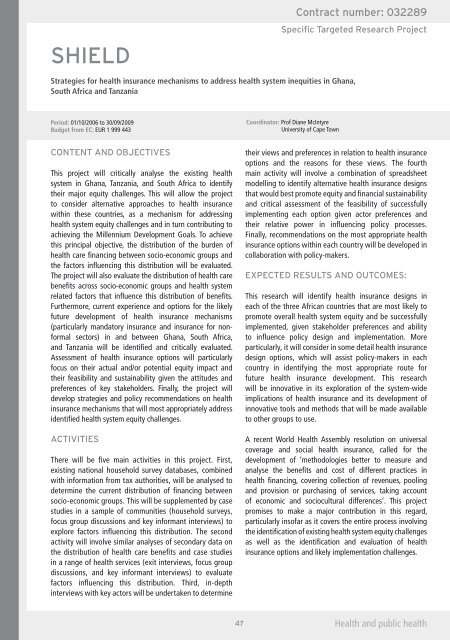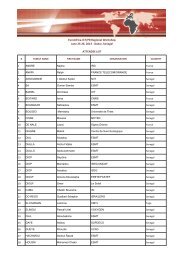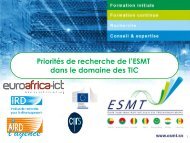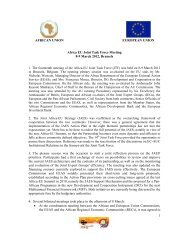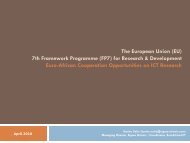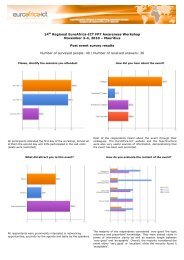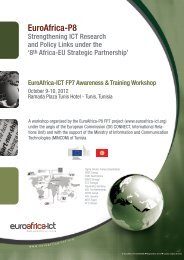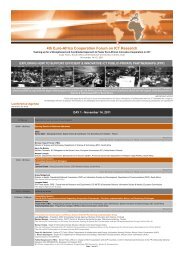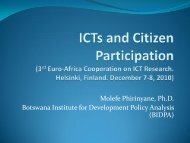part 1 - EuroAfrica-ICT
part 1 - EuroAfrica-ICT
part 1 - EuroAfrica-ICT
Create successful ePaper yourself
Turn your PDF publications into a flip-book with our unique Google optimized e-Paper software.
Strategies for health insurance mechanisms to address health system inequities in Ghana,South Africa and TanzaniaPeriod: 01/10/2006 to 30/09/2009Budget from EC: EUR 1 999 443Coordinator: Prof Diane McIntyreUniversity of Cape TownThis project will critically analyse the existing healthsystem in Ghana, Tanzania, and South Africa to identifytheir major equity challenges. This will allow the projectto consider alternative approaches to health insurancewithin these countries, as a mechanism for addressinghealth system equity challenges and in turn contributing toachieving the Millennium Development Goals. To achievethis principal objective, the distribution of the burden ofhealth care financing between socio-economic groups andthe factors influencing this distribution will be evaluated.The project will also evaluate the distribution of health carebenefits across socio-economic groups and health systemrelated factors that influence this distribution of benefits.Furthermore, current experience and options for the likelyfuture development of health insurance mechanisms(<strong>part</strong>icularly mandatory insurance and insurance for nonformalsectors) in and between Ghana, South Africa,and Tanzania will be identified and critically evaluated.Assessment of health insurance options will <strong>part</strong>icularlyfocus on their actual and/or potential equity impact andtheir feasibility and sustainability given the attitudes andpreferences of key stakeholders. Finally, the project willdevelop strategies and policy recommendations on healthinsurance mechanisms that will most appropriately addressidentified health system equity challenges.There will be five main activities in this project. First,existing national household survey databases, combinedwith information from tax authorities, will be analysed todetermine the current distribution of financing betweensocio-economic groups. This will be supplemented by casestudies in a sample of communities (household surveys,focus group discussions and key informant interviews) toexplore factors influencing this distribution. The secondactivity will involve similar analyses of secondary data onthe distribution of health care benefits and case studiesin a range of health services (exit interviews, focus groupdiscussions, and key informant interviews) to evaluatefactors influencing this distribution. Third, in-depthinterviews with key actors will be undertaken to determinetheir views and preferences in relation to health insuranceoptions and the reasons for these views. The fourthmain activity will involve a combination of spreadsheetmodelling to identify alternative health insurance designsthat would best promote equity and financial sustainabilityand critical assessment of the feasibility of successfullyimplementing each option given actor preferences andtheir relative power in influencing policy processes.Finally, recommendations on the most appropriate healthinsurance options within each country will be developed incollaboration with policy-makers.This research will identify health insurance designs ineach of the three African countries that are most likely topromote overall health system equity and be successfullyimplemented, given stakeholder preferences and abilityto influence policy design and implementation. More<strong>part</strong>icularly, it will consider in some detail health insurancedesign options, which will assist policy-makers in eachcountry in identifying the most appropriate route forfuture health insurance development. This researchwill be innovative in its exploration of the system-wideimplications of health insurance and its development ofinnovative tools and methods that will be made availableto other groups to use.A recent World Health Assembly resolution on universalcoverage and social health insurance, called for thedevelopment of ‘methodologies better to measure andanalyse the benefits and cost of different practices inhealth financing, covering collection of revenues, poolingand provision or purchasing of services, taking accountof economic and sociocultural differences’. This projectpromises to make a major contribution in this regard,<strong>part</strong>icularly insofar as it covers the entire process involvingthe identification of existing health system equity challengesas well as the identification and evaluation of healthinsurance options and likely implementation challenges.Health and public health


